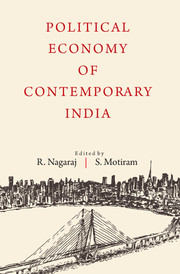1 - Introduction: From ‘Intermediate Regime’ to Crony Capitalism
Published online by Cambridge University Press: 08 February 2018
Summary
Introduction
This volume brings a selection of papers which were presented at a conference on “Political Economy of Contemporary India” at Indira Gandhi Institute of Development Research, Mumbai (IGIDR) in November 2014. The conference was organised by the desire to re-focus academic attention on issues which have enormous significance for understanding the recent developments in the economy and polity of India, and that often seem to fall between the increasingly narrow disciplinary boundaries in social sciences. It also sought to revive the academic culture that looked at contemporary problems in a more holistic fashion in the classical traditions of political economy.
The papers were rich and varied, and were presented from diverse disciplinary and analytical perspectives, but clearly focused on illuminating many recent concerns. This introduction seeks to locate these papers in the context of the ongoing discourse on India's political economy. However, considering the voluminous and multi-disciplinary nature of this discourse, the introduction would necessarily have to be selective in choosing only the pieces that in our view have shaped the contours of the literature and have set the research agenda. Such an attempt would inevitably involve the authors’ professional (or other) biases, which, we believe, readers will appreciate.
India's Political Economy: An Overview
For a long time in post-independent India, economists, who occupied a pre-eminent position in the national development discourse, had agonized over the nation's modest (or mediocre) economic performance. Though it represented a distinct break from the colonial stagnation, and has accelerated in recent decades, the output growth per capita has remained modest relative to its potential (both natural and economic), and compared to the achievements of its peers in Asia. This was especially true during the first three decades after independence, when despite a variety of development plans and programmes, the economy refused to budge from the trend growth rate of about 3.5 per cent per year. Professor Raj Krishna disparagingly termed this “changelessness” in performance as “the Hindu growth rate”. Raj Krishna's somewhat lessacknowledged, short essay titled, “Stagnant Parameters” in Seminar in 1984, provided copious evidence to substantiate “his popular imagery”.
- Type
- Chapter
- Information
- Political Economy of Contemporary India , pp. 1 - 22Publisher: Cambridge University PressPrint publication year: 2016



